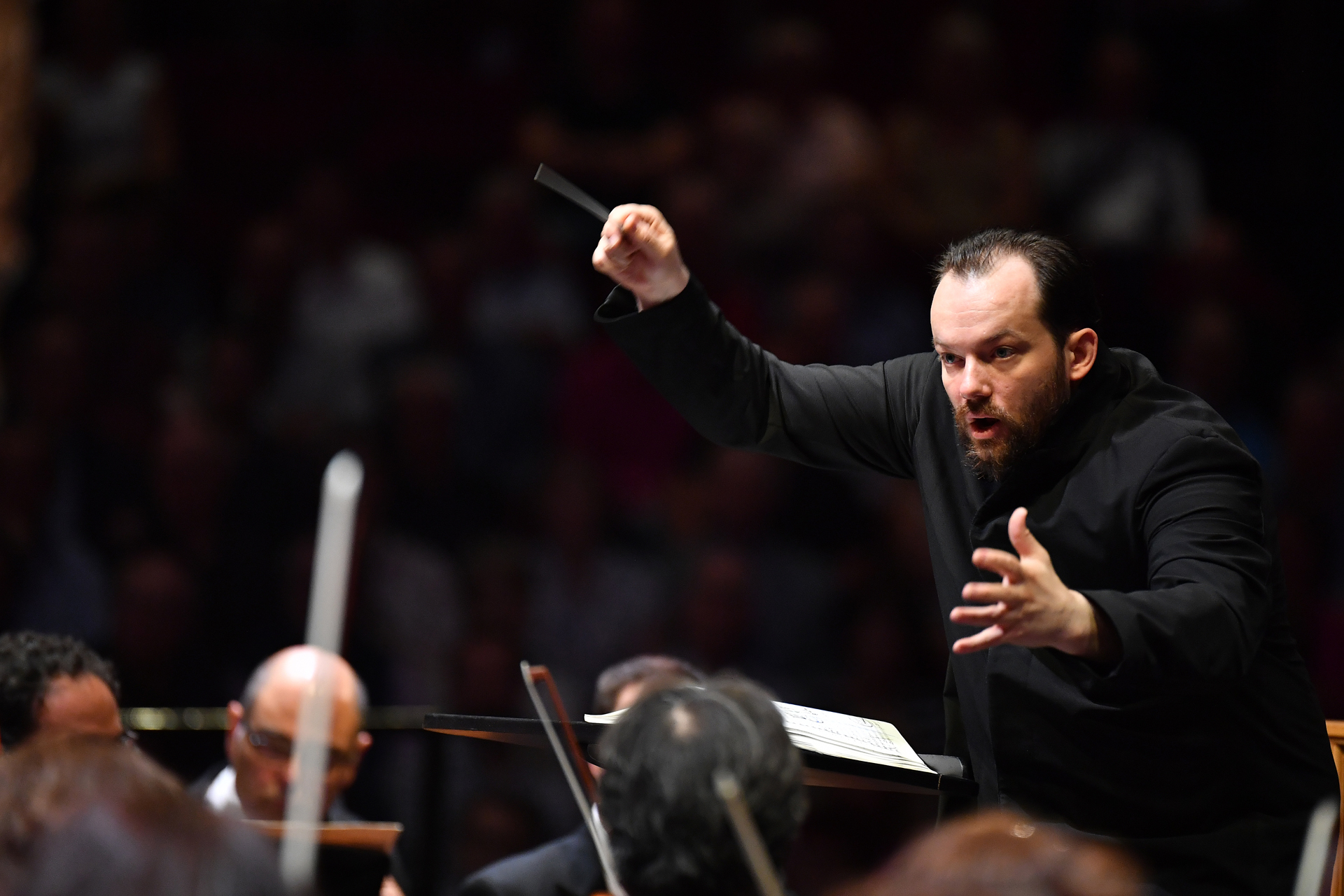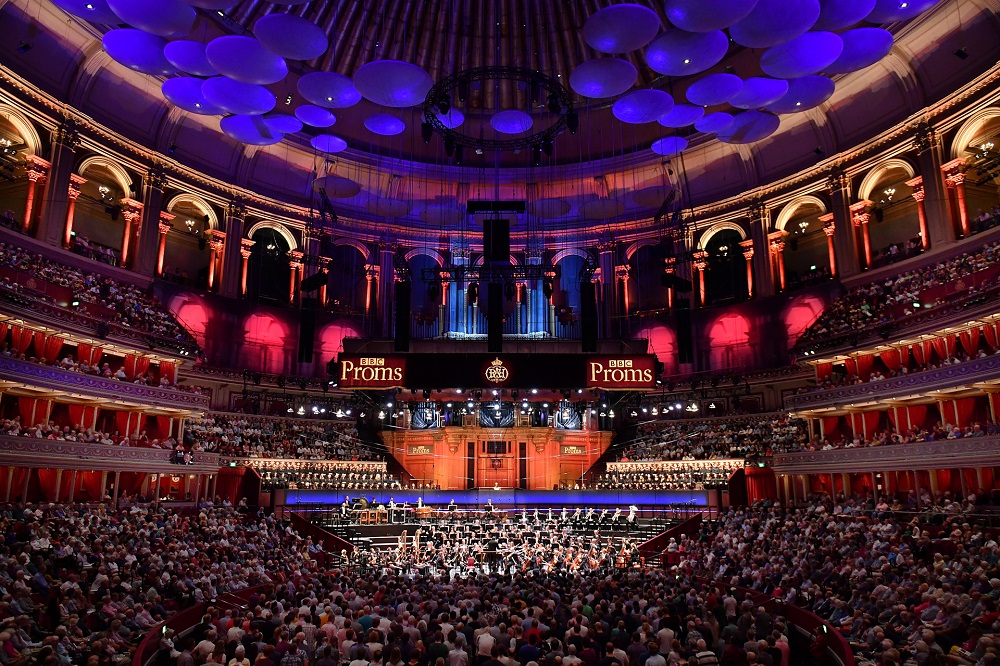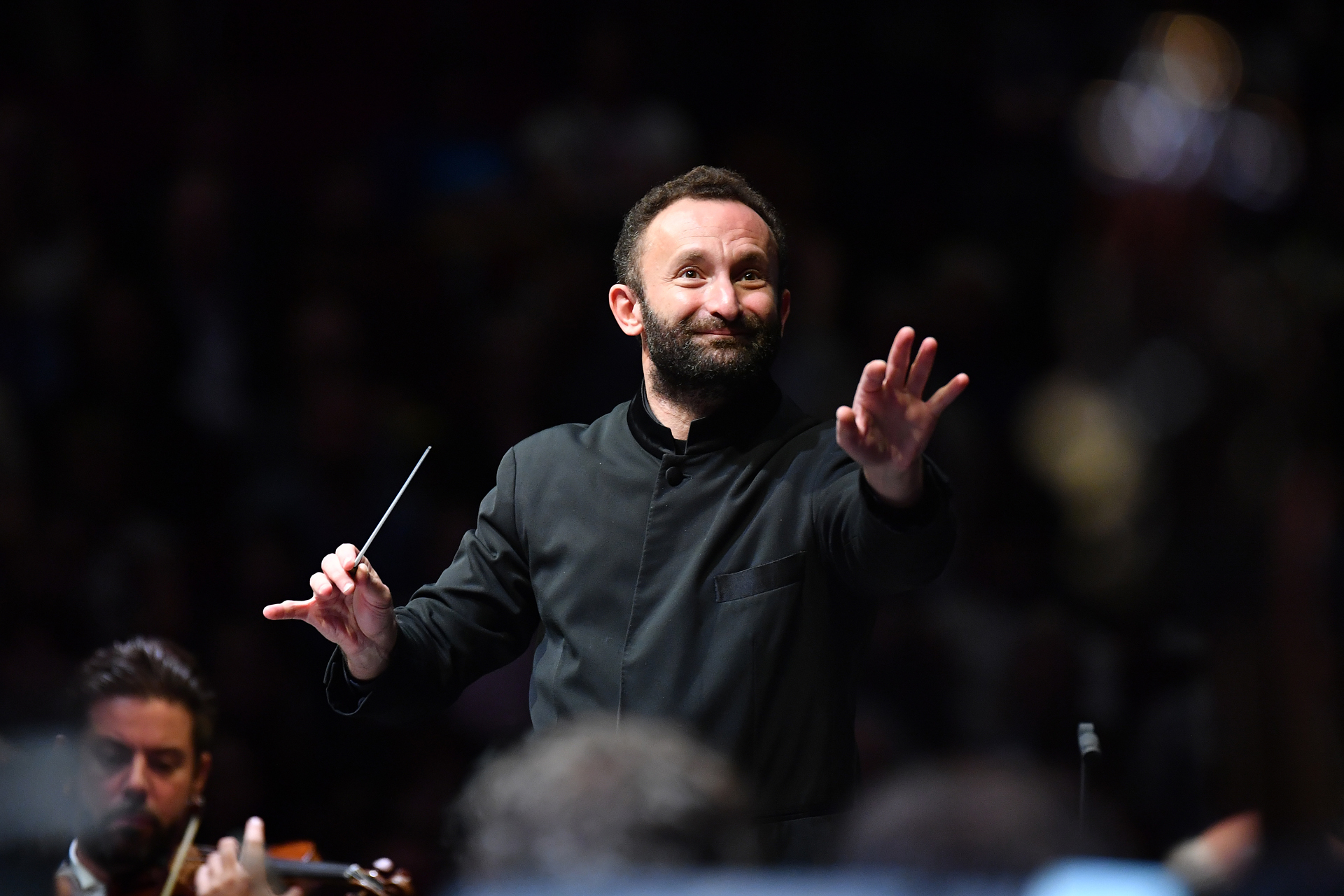Prom 67, Boston Symphony Orchestra, Nelsons / Prom 68, Berlin Philharmonic, Petrenko review - frenzy and finesse | reviews, news & interviews
Prom 67, Boston Symphony Orchestra, Nelsons / Prom 68, Berlin Philharmonic, Petrenko review - frenzy and finesse
Prom 67, Boston Symphony Orchestra, Nelsons / Prom 68, Berlin Philharmonic, Petrenko review - frenzy and finesse
Two great visiting orchestras blow a pagan whirlwind through the Proms
Did the earth move for us? You bet.
My colleague David Nice invoked the legendary incandescence of Carlos Kleiber to define the head-spinning alloy of frenzy and finesse that the Berliners’ incoming chief conductor Kirill Petrenko draws from his magisterial band. The comparison illuminates much. But this Seventh almost seemed to out-Kleiber Kleiber. Its ecstatic radiance rounded off a pair of Proms that had summoned the pagan spirits of the earth and air with such gusto that you half-expected to exit the Albert Hall and find the Great God Pan himself strutting through the late-summer dusk in Kensington Gardens.
Andris Nelsons (pictured below), music director in Boston (and now Leipzig) after a seven-year stint with the City of Birmingham Symphony Orchestra, had in 2015 reached the final round in the fractious contest to succeed Sir Simon Rattle in Berlin. The chance to hear peak performances from both winner and runner-up on the same day confirmed that the lustre of the Proms can still glow as powerfully as ever.
At least in the opening extravaganza, this wasn’t the smoothest or sleekest rendering of Mahler’s vision of nature in all its glory and terror. You rightly felt that the music, as it tugs in all directions, stands on the very brink of a tonal breakdown. Even the sunlit minuet of the second movement avoided too much countrified charm to sound, at its climax, like a fairy frolic with a demon in its midst. The wistful posthorn serenade in the next section (forest animals, after forest flowers, according to the programmatic schedule that Mahler half-seriously proposed for the work) gave way to a terrifying brass-led climax. The Bostonians could sound forcefully homespun as well as proudly heroic. The grain of their sound intermittently felt rough, but never bland or dull. 
So it proved as Graham’s solo gave way to the children’s and women’s choruses of the fifth movement (chapeau bas to the splendid CBSO chorus and youth chorus), with its unearthly bell-chime accompaniments and heavenly folksiness. The Third’s concluding adagio brought out the best from Nelsons’ Bostonians. Exquisitely detailed conversations between violin and horn, oboe and flute, enriched the lyrical sweep and swoon of their luscious strings. Mahler’s last-movement ascents towards divine revelation never cease to sound (in Nietzsche’s own words) human, all too human – and, in Nelsons’ hands, that spiritual uplift retained a warm, earthbound heartbeat. I’m not sure that the Boston band – or any outfit – could entirely control the chaotic, centrifugal aspects of this mammoth work. But what a thrill to hear them ride its tempest.
As the sun set, Petrenko (pictured below) and the Berliners took the stage with a slightly disconcerting first half. It consisted of back-to-back Strauss tone-poems: Don Juan followed by Death and Transfiguration. (If he had plumped for Also Sprach Zarathustra, we would have had a full-blown Nietzsche tribute day.) Why both? I suppose that the pairing amounts to a sort of narrative “symphony”, as the erotic egotist of the first morphs into the stricken and aspiring soul of the second. But once Petrenko began to unleash the awesome orchestral beast under his baton, all speculation ceased. Nothing I could say about (for instance) the astonishing power and precision of the heroic horn theme in Don Juan has not been said many times before. But it’s worth noting, though, that Petrenko has spent much of the past decade in opera houses (Berlin, then Munich).
That said, the Beethoven took off like a rocket – but always one under supremely expert guidance. From first to last, the pulse of the dance never slackened or wavered. Just as remarkable were the startling dynamic shifts – sudden roars and whispers that always lay in ambush for the lazy ear. The "allegretto" second movement lived up to its billing: no funeral march here, but a brisk, alert drive through the darkness. Petrenko’s scherzo allowed his flair for ever-changing drama and contrast to flourish. And the finale, although truly exhilarating, never descended into mere manic stampede. Petrenko retained a sense of shape and balance in the midst of all the fire and fury. Even here, the individual voices of his instrumental stars came through in all their colour and control. If the Berliners took your breath away, they didn’t demand total surrender. Petrenko’s galvanic combination of intelligence and intensity set the seal on an extraordinary day; the kind that makes the Proms unique. Let’s hope for more next year.
- Listen on the BBC iPlayer to Prom 67 and Prom 68 for the next month
- Read more classical music reviews on theartsdesk
rating
Share this article
The future of Arts Journalism
You can stop theartsdesk.com closing!
We urgently need financing to survive. Our fundraising drive has thus far raised £49,000 but we need to reach £100,000 or we will be forced to close. Please contribute here: https://gofund.me/c3f6033d
And if you can forward this information to anyone who might assist, we’d be grateful.

Subscribe to theartsdesk.com
Thank you for continuing to read our work on theartsdesk.com. For unlimited access to every article in its entirety, including our archive of more than 15,000 pieces, we're asking for £5 per month or £40 per year. We feel it's a very good deal, and hope you do too.
To take a subscription now simply click here.
And if you're looking for that extra gift for a friend or family member, why not treat them to a theartsdesk.com gift subscription?
more Classical music
 From Historical to Hip-Hop, Classically Black Music Festival, Kings Place review - a cluster of impressive stars for the future
From quasi-Mozartian elegance to the gritty humour of a kitchen inspection
From Historical to Hip-Hop, Classically Black Music Festival, Kings Place review - a cluster of impressive stars for the future
From quasi-Mozartian elegance to the gritty humour of a kitchen inspection
 Shibe, LSO, Adès, Barbican review - gaudy and glorious new music alongside serene Sibelius
Adès’s passion makes persuasive case for the music he loves, both new and old
Shibe, LSO, Adès, Barbican review - gaudy and glorious new music alongside serene Sibelius
Adès’s passion makes persuasive case for the music he loves, both new and old
 Anja Mittermüller, Richard Fu, Wigmore Hall review - a glorious hall debut
The Austrian mezzo shines - at the age of 22
Anja Mittermüller, Richard Fu, Wigmore Hall review - a glorious hall debut
The Austrian mezzo shines - at the age of 22
 First Person: clarinettist Oliver Pashley on the new horizons of The Hermes Experiment's latest album
Compositions by members of this unusual quartet feature for the first time
First Person: clarinettist Oliver Pashley on the new horizons of The Hermes Experiment's latest album
Compositions by members of this unusual quartet feature for the first time
 Gesualdo Passione, Les Arts Florissants, Amala Dior Company, Barbican review - inspired collaboration excavates the music's humanity
At times it was like watching an anarchic religious procession
Gesualdo Passione, Les Arts Florissants, Amala Dior Company, Barbican review - inspired collaboration excavates the music's humanity
At times it was like watching an anarchic religious procession
 Classical CDs: Camels, concrete and cabaret
An influential American composer's 90th birthday box, plus British piano concertos and a father-and-son duo
Classical CDs: Camels, concrete and cabaret
An influential American composer's 90th birthday box, plus British piano concertos and a father-and-son duo
 Cockerham, Manchester Camerata, Sheen, Martin Harris Centre, Manchester review - re-enacting the dawn of modernism
Two UK premieres added to three miniatures from a seminal event of January 1914
Cockerham, Manchester Camerata, Sheen, Martin Harris Centre, Manchester review - re-enacting the dawn of modernism
Two UK premieres added to three miniatures from a seminal event of January 1914
 Kempf, Brno Philharmonic, Davies, Bridgewater Hall, Manchester review - European tradition meets American jazz
Bouncing Czechs enjoy their Gershwin and Brubeck alongside Janáček and Dvořák
Kempf, Brno Philharmonic, Davies, Bridgewater Hall, Manchester review - European tradition meets American jazz
Bouncing Czechs enjoy their Gershwin and Brubeck alongside Janáček and Dvořák
 Solomon, OAE, Butt, QEH review - daft Biblical whitewashing with great choruses
Even a top soprano and mezzo can’t make this Handel paean wholly convincing
Solomon, OAE, Butt, QEH review - daft Biblical whitewashing with great choruses
Even a top soprano and mezzo can’t make this Handel paean wholly convincing
 Two-Piano Gala, Kings Place review - shining constellations
London Piano Festival curators and illustrious friends entertain and enlighten
Two-Piano Gala, Kings Place review - shining constellations
London Piano Festival curators and illustrious friends entertain and enlighten
 Echo Vocal Ensemble, Latto, Union Chapel review - eclectic choral programme garlanded with dance
Beautiful singing at the heart of an imaginative and stylistically varied concert
Echo Vocal Ensemble, Latto, Union Chapel review - eclectic choral programme garlanded with dance
Beautiful singing at the heart of an imaginative and stylistically varied concert
 Scott, Irish Baroque Orchestra, Whelan, RIAM, Dublin review - towards a Mozart masterpiece
Characteristic joy and enlightenment from this team, but a valveless horn brings problems
Scott, Irish Baroque Orchestra, Whelan, RIAM, Dublin review - towards a Mozart masterpiece
Characteristic joy and enlightenment from this team, but a valveless horn brings problems
